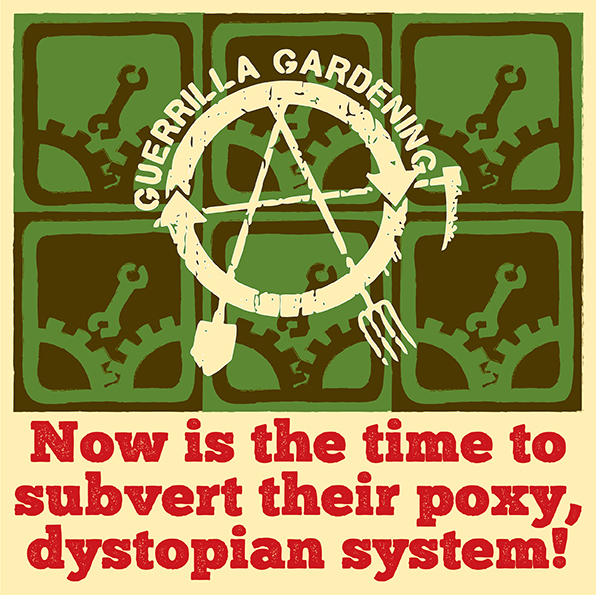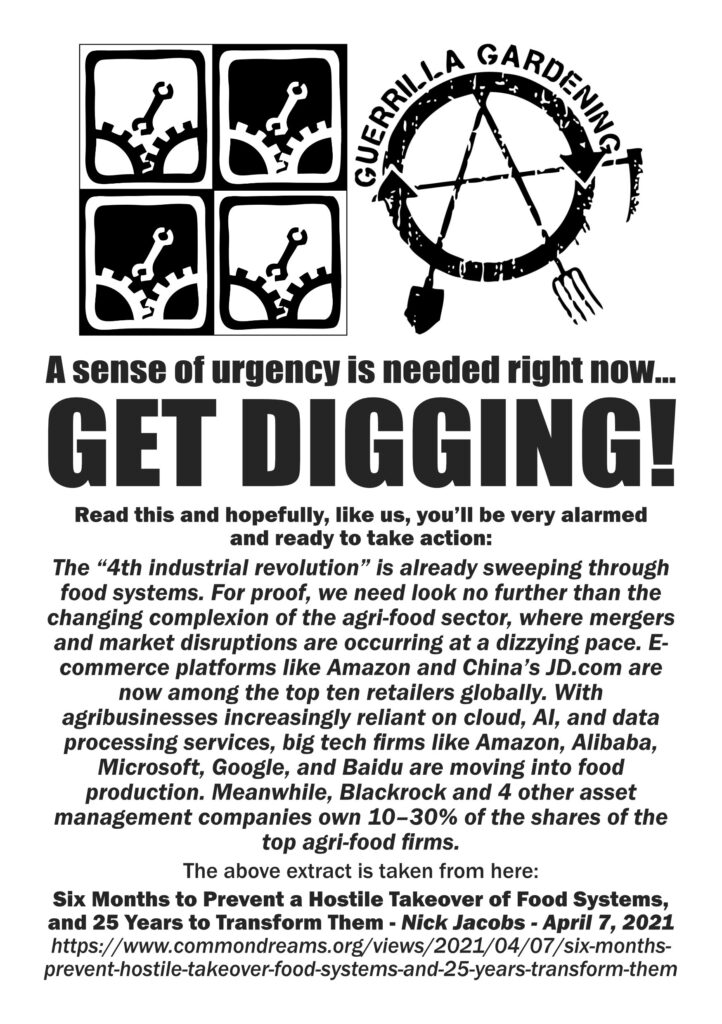
We recently published this post on our sister blog, Alternative Estuary (see the link in the sidebar): A sense of urgency is needed right now! – April 11, 2021.
Following on from this, we have also produced a four page leaflet using an edited version of the text in the post: GET DIGGING! – April 12, 2021.
The prompt for doing this was reading these two posts: Six Months to Prevent a Hostile Takeover of Food Systems, and 25 Years to Transform Them – Nick Jacobs – Common Dreams – April 7, 2021 and: Bill Gates is the biggest private owner of farmland in the United States. Why? – Nick Estes – Guardian – April 5, 2021.
This quote is from the Common Dreams piece:
The “4th industrial revolution” is already sweeping through food systems. For proof, we need look no further than the changing complexion of the agri-food sector, where mergers and market disruptions are occurring at a dizzying pace. E-commerce platforms like Amazon and China’s JD.com are now among the top ten retailers globally. With agribusinesses increasingly reliant on cloud, AI, and data processing services, big tech firms like Amazon, Alibaba, Microsoft, Google, and Baidu are moving into food production. Meanwhile, Blackrock and 4 other asset management companies own 10–30% of the shares of the top agri-food firms.
This is from the piece about Bill Gates:
Like wealth, land ownership is becoming concentrated into fewer and fewer hands, resulting in a greater push for monocultures and more intensive industrial farming techniques to generate greater returns. One per cent of the world’s farms control 70% of the world’s farmlands, one report found. The biggest shift in recent years from small to big farms was in the US.
The principal danger of private farmland owners like Bill Gates is not their professed support of sustainable agriculture often found in philanthropic work – it’s the monopolistic role they play in determining our food systems and land use patterns.
The Fourth Industrial Revolution is in part, an acceleration of trends towards an economy of scale when it comes to food production that makes it impossible for small independent producers to compete. The level of technology involved in this mode of food production, and its cost, mean that only the big corporations can afford to get involved. Also, the high tech industrialisation of food production further removes us from any connection to nature and an understanding of how our food should be a part of nature, not something totally divorced from it. When you take into consideration the sheer amount of farmland that’s being brought up by oligarchs and corporations, there’s the realisation that our food supply is being concentrated into fewer and fewer hands with decidedly dubious motives. That for us, is an alarming and chilling development…
Here’s a little bit of historical context – our relationship to the land and the food it produces has been changing for centuries. The catalyst for this was the start of enclosure – historical developments which are dealt with in both of these wide ranging pieces: The Ancient Roots of Trespass – Tom Banbury | Tribune | January 28, 2021 and: A History of Landlords: Rent & the Feudal Origins of a Non-Working Class – John Laurits | September 26, 2018.
Despite industrialisation, there has always been a core of people who want to maintain a close relationship with the land and the degree of control over their food supply that can offer. Allotments have been a way for some of us to maintain a close link to the land and the food we can grow from it: A Brief History of Allotments, Part 1: up to 1900 – Lost in the Plot – November 18, 2020. Given recent events such as fears Brexit would lead to shortages of come foods and the panic buying at the start of the coronavirus crisis in March 2020 that led to a number of shelves being emptied, there has been a resurgence of interest in ‘growing your own’: Has the perception of allotments changed in the last few weeks? – Lost in the Plot – May 23, 2020.
This could be seen as limited to those who can secure an allotment, have a house with a decent sized garden or the financial wherewithal to own enough land for a smallholding. It could be argued that those able to do this are possibly a bit on the privileged side. We really want to change that perception. In this post on Alternative Estuary – Guerilla gardening – getting on with it:) – April 12, 2021 – we have pointed out that residents on an estate can get together, secure a piece of land and start to grow at least some of the food they need. This is because a key part of the struggle to regain control of our food supply is challenging the patterns of land ownership that are concentrating farmland into fewer and fewer hands. By necessity, one part of that challenge has to be a strategy of guerilla gardening.
We’re in a situation where the vast majority of people have to work to earn money to buy the food they need rather than being able to take the time out and access the land they need to start growing their own. It’s been like this since the dawn of industrialisation. Understandably, people leading busy lives have embraced the convenience of others taking on the business of producing and providing their food. This is despite the recognition that companies involved in the food business are motivated by profit and have not always had our best interests at heart. Generally, people have just said ‘that’s the way it is’, shrugged their shoulders and got on with their lives. What makes the current situation dangerous is the rapid acceleration of the production of our food being concentrated into the hands of corporations and oligarchs with some pretty disturbing agendas.
As we’ve said a fair few times before, whoever controls the food supply controls the population. We’ve seen over the last year how the coronavirus crisis has been leveraged to accelerates the changes that were already happening as a part of the Fourth Industrial Revolution. Should the move towards a cashless society continue in tandem with the floating of the possibility of state facilitated Universal Basic Income eventually leading to the kind of social credit system that’s already in operation in China, we’re in deep trouble. Namely because our access to food will depend on how well we behave ourselves in the eyes of an all seeing state serving the desires of the corporations and oligarchs. While we don’t want to get sidetracked or dragged into a row over this, it has to be pointed out that over the last year, it is possible for governments to manipulate people’s behaviour in order to achieve what they see as a desired outcome. When the state and corporations have full control over your access to food, that is the ultimate tool in maintaining social control and compliance.
So, this is the context for the tone of posts that are now going up on Alternative Estuary and also for the production of the GET DIGGING! leaflet. Rather than carry on getting bogged down in the rows about lockdowns, tiered restrictions, masking and vaccines, we’re trying to look ahead at what’s rapidly coming towards us with the food situation and suggest ways of resisting this.
There’s one thing we and a few other people we’ve worked with have practical experience of, and that’s growing at least some of our food. This is why Alternative Estuary is an important project because it is about mobilising and supporting people at the grassroots to initiate projects that will enable them to start gaining more control over what happens in their neighbourhoods. A key part of that is people being able to start taking back some degree of control over their food supply by growing and producing what they can. This is why we wrote this post at the start of the year – Why what we do IS political – January 12, 2021 – in a bid to dispel any misconception that it’s a fluffy project.
